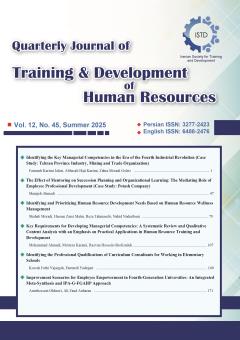Respecting the rules of ethics in publications, this journal is subject to the rules of the Committee on Ethics in Publication (COPE) and also follows the executive regulations of the law on preventing and dealing with plagiarism in scientific papers.
Article acceptance conditions in terms of content:
- Papers should be in line with the goals of the quarterly.
- Papers should have scientific and research aspects.
- Papers should be the result of studies, experiences and researches of the author/authors.
- Papers have not been submitted to any national or international journals or published in any publication.
The articles submitted are checked by plagiarism checker website (https://tik.irandoc.ac.ir/) before being sent to the reviewer either by the journal expert or during the peer review process according to the reviewers’ recommendations:
- The Quarterly Journal of Training and Development of Human Resources has a legal account in the plagiarism checker website (https://tik.irandoc.ac.ir/); hence, all the articles registered in the review stage are registered and reviewed by the editor in the plagiarism checker website (https://tik.irandoc.ac.ir/) after confirming that they are related to the specialized axes of the publication. It should be mentioned that in the case of the detecting similarity, the articles will be removed from the review process of the journal.
The final requirements for articles accepted to be published in the quarterly journal:
- Approval of selected reviewers of the journal’s Scientific Council
- Approval of the journal’s Scientific Council
- Deposit of 2,000,000 IRRs for the peer review costs and 8,000,000 IRRs for publication after technical approval by the author or authors.
It is possible to accept and publish an article in the Quarterly Journal of Training and Development of Human Resources only if the following conditions are met:
1- The submitted article or its content must not have been previously published in a journal or simultaneously submitted to another journal, and in case of acceptance in the journal, it must not be presented or published elsewhere.
2- The preparation of the article must be free of any malpractice, unethical act and violation of scientific norms, including falsification of data, distortion of facts, scientific plagiarism in presenting analysis or performing experiments and checking the opinions of others, or in expressing research results. If any question is raised by the members of the editorial board regarding the ethical matters, the author is committed to answer and preserves the right to defend the verdict of the evidence and request a thorough and quick investigation.
3- The list of authors should show exactly who did the research and who wrote the article. It is necessary to mention the responsible person and colleagues in the article and be careful in exclusion of unrelated names. The person responsible for the article is the person who has contributed significantly to preparing, designing and implementing the article, and the names of other authors are also mentioned as collaborators in the article, and the main author of the article is required to have the names and information of all authors and ensure the exclusion of names other than the authors of the article.
4- The personal information of the authors of the articles is confidential for all those who have access to it, including the editor, editorial members and executive officers of the publication, and it is protected at all times.
5- The articles presented by the authors must be the author's own work, and if other people's research is used, it must be cited in the article.
6- Decisions about the articles are made under the supervision of the editorial board and through the appointment of qualified reviewers.
7- The peer review of the received articles is conducted by several reviewers without informing them of the names of the authors. The opinions of the reviewers will be announced to the author after summing up.
8- The use of other people's research results must be done with reference and written permission from the authors.
9- The members of the editorial board should not participate in the peer review process of their works and articles.


